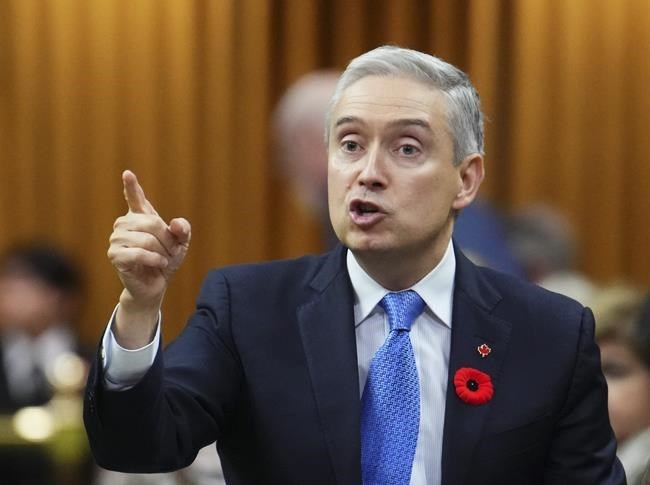
Innovation, Science and Industry Minister Francois-Philippe Champagne rises during question period in the House of Commons on Parliament Hill in Ottawa on Monday, Nov. 6, 2023. THE CANADIAN PRESS/Sean Kilpatrick
Republished November 07, 2023 - 3:36 PM
Original Publication Date November 07, 2023 - 10:26 AM
Industry Minister François-Philippe Champagne won't say whether the process to replace a fleet of aging military patrol planes will be an open-source bid, as the heads of Canada's two biggest provinces and Bombardier Inc. urge him to "level the playing field" in a "deeply flawed process."
On Tuesday, Champagne told reporters in Ottawa that the federal government has so far steered clear of a determination on whether Montreal-based Bombardier Inc. will have a chance to submit a tender on the new reconnaissance aircraft.
“There is no decision made,” Champagne said in French. "In military acquisitions, it is rarely very, very fast. It's complex, too."
Citing cost, availability and capability, he said, "We will make the best decision in the interest of Canadians."
For months, Bombardier CEO Éric Martel has been pushing Ottawa to put out a request for proposals as he promotes the company's still non-existent surveillance plane over a Boeing Co. alternative — the apparent front-runner.
On Tuesday, he told the House of Commons defence committee that the procurement process was "deeply flawed and lacking transparencies." Martel claimed the government made critical changes to its criteria — among them a much shorter delivery timeline and an existing, "off-the-shelf" product — without telling industry players.
Bombardier joined forces earlier this year with U.S.-based General Dynamics on a patrol aircraft, a modified version of its Global 6500 business jet with submarine-hunting technology.
Both partners have called on the government to launch an open procurement process to supplant the Royal Canadian Air Force's 14 CP-140 Aurora maritime patrol planes, built by Lockheed Martin and set to retire in 2030 after a half-century of service.
However, Simon Page, an assistant deputy minister of defence and marine procurement, told the defence committee Tuesday that "we concluded that the P-8A Poseidon was the best aircraft to meet Canada’s operational needs." The Poseidon is built by Boeing.
That view reiterates an analysis from Public Services and Procurement Canada, which points to the plane's strong suits on intelligence-gathering, surveillance and anti-submarine warfare. But the department's conclusion does not trigger "a certain direction" for the procurement process, Page qualified — either sole-source or open-source.
Earlier in the day, Ontario Premier Doug Ford and Quebec Premier François Legault renewed their demand from July to "level the playing field" and launch an open bid.
"While Canadian manufacturers are stepping up and have responded to their call, the federal government continues to signal its intent to lock these companies and workers out of its procurement process," the premiers said in a joint statement.
They called on the House of Commons to ask the parliamentary budget officer to review the costs and "consequences" of such a move.
Meanwhile, Bombardier's CEO extolled his plane's benefits, claiming it would be up to 40 per cent cheaper than Boeing's and noting it would be built and assembled in Montreal and Toronto.
"We can do it and we can actually deliver a superior product," Martel told reporters after a speech to the annual Canadian Aerospace Summit in Ottawa on Tuesday morning.
Boeing, like Bombardier and General Dynamics, has sought to tout its Canadian bona fides.
The aircraft giant's P-8A would sustain more than 2,900 jobs and generate $358 million in economic output in Canada annually, according to a Boeing-commissioned study by management consultants Doyletech Corp.
The federal government has also noted the P-8's prevalence among Canadian allies.
“This platform is a proven capability that is operated by several of Canada’s defence partners including all of its Five Eyes allies — the United States, United Kingdom, Australia, New Zealand — as well as Norway and South Korea. Germany has also recently purchased this platform,” the procurement department said in a March 27 statement.
In February 2022, the department sent a letter of request for an offer on 16 Boeing aircraft via the U.S. government's foreign military sales program. It qualified that its ask "does not commit Canada to purchasing the P-8A Poseidon and the project remains in options analysis.''
On Tuesday, Champagne highlighted Canadian aerospace suppliers' links to a range of manufacturers — not just Canadian ones — suggesting that a contract with a foreign firm could still have lucrative ripple effects at home.
“Quebec is the third-largest platform in the world for building aircraft,” Champagne said.
“Never forget that there are suppliers who supply both Bombardier on one side and Boeing on the other … in Quebec,” he said.
“Our duty to taxpayers is to make the best decision for taxpayers, for defence, for national security, but obviously for the ecosystem.”
Quebec plays host to 61 per cent of Canada's jobs in the aerospace sector, according to the U.S. International Trade Administration.
The industry contributed over $27 billion to Canada's GDP and nearly 212,000 jobs to its economy last year, the trade administration says, though most of the output goes toward civil aviation rather than defence.
Troy Crosby, an assistant deputy minister of defence overseeing materiel, said Tuesday that procuring replacements for the Aurora aircraft is not an "urgent operational requirement," given their retirement date "isn't terribly precise."
— With files from Michel Saba in Ottawa
This report by The Canadian Press was first published Nov. 7, 2023.
Companies in this story: (TSX:BBD.B)
News from © The Canadian Press, 2023